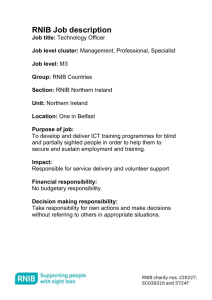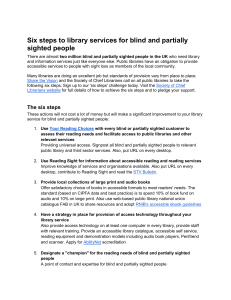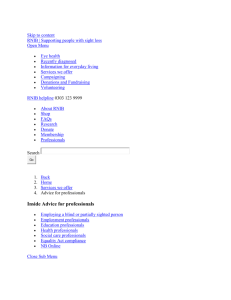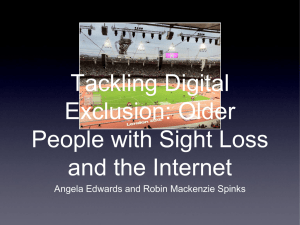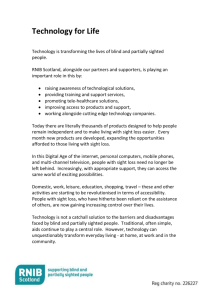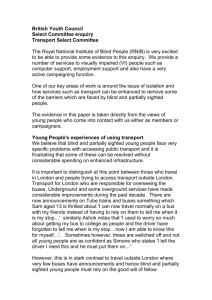This Is working
advertisement
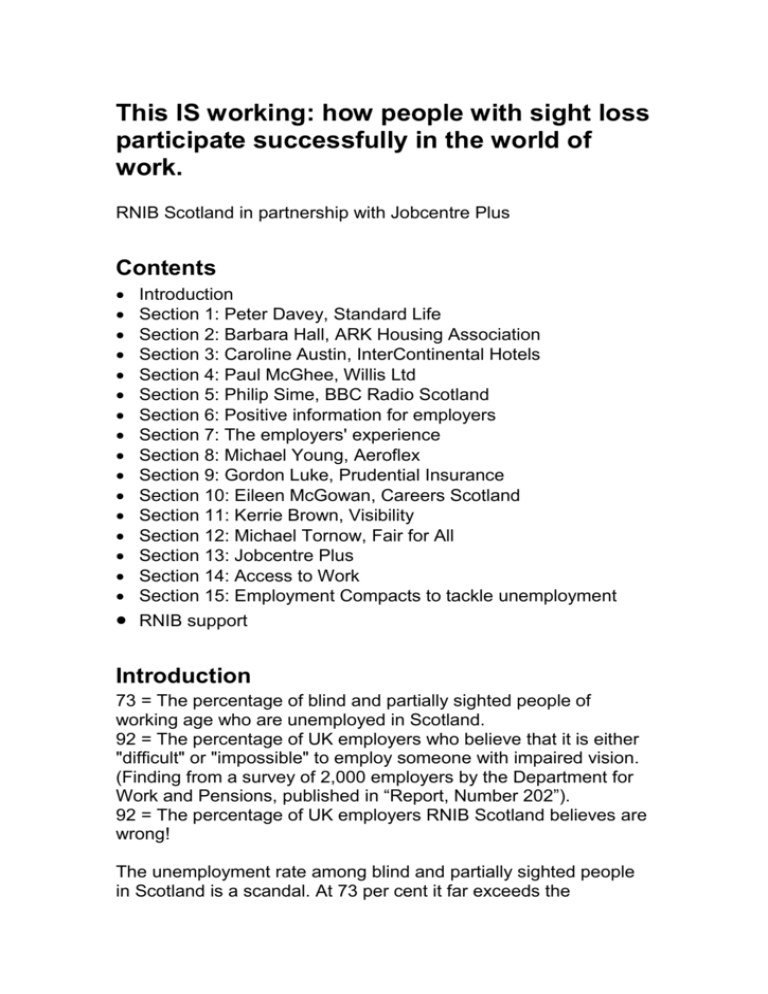
This IS working: how people with sight loss participate successfully in the world of work. RNIB Scotland in partnership with Jobcentre Plus Contents Introduction Section 1: Peter Davey, Standard Life Section 2: Barbara Hall, ARK Housing Association Section 3: Caroline Austin, InterContinental Hotels Section 4: Paul McGhee, Willis Ltd Section 5: Philip Sime, BBC Radio Scotland Section 6: Positive information for employers Section 7: The employers' experience Section 8: Michael Young, Aeroflex Section 9: Gordon Luke, Prudential Insurance Section 10: Eileen McGowan, Careers Scotland Section 11: Kerrie Brown, Visibility Section 12: Michael Tornow, Fair for All Section 13: Jobcentre Plus Section 14: Access to Work Section 15: Employment Compacts to tackle unemployment RNIB support Introduction 73 = The percentage of blind and partially sighted people of working age who are unemployed in Scotland. 92 = The percentage of UK employers who believe that it is either "difficult" or "impossible" to employ someone with impaired vision. (Finding from a survey of 2,000 employers by the Department for Work and Pensions, published in “Report, Number 202”). 92 = The percentage of UK employers RNIB Scotland believes are wrong! The unemployment rate among blind and partially sighted people in Scotland is a scandal. At 73 per cent it far exceeds the unemployment rate of 55 per cent for people with other disabilities, and is an outrageous 15 times greater than the figure for the general population. (Data from “Measuring progress towards a smart, successful Scotland”. Scottish Executive, 2006). “This IS working” tells the story of 10 men and women who are blind or partially sighted. They are working in a wide range of jobs, supporting themselves and their families, contributing to their employer's success and using their energies and talents to further the wealth and well-being of our society. They provide a powerful response to the widely held belief that they cannot play their part in the workplace. In the words of Philip Sime, a BBC Scotland researcher who is registered blind: "92 per cent of those same employers would not be able to do my job without the proper training and support. If blind people are given the right training and support, they are capable of being equal in the workplace." This IS working shows how the challenges of sight loss can be overcome in the workplace. It explains how employers can play their part in providing equal opportunities in the job market (sections 6 and 7) and describes the resources and support available from RNIB, Jobcentre Plus and elsewhere (section 13 onwards). Section1: Peter Davey, Standard Life "I'm an IT project manager with Standard Life. I manage a 10strong team of IT professionals - programmers and analysts developing IT systems. A recent project applied flexibility to a pension product to allow customers to vary premiums during their career." Peter Davey has worked in IT for 25 years and has been with Standard Life since 1991. He has a degree in science from Durham University and his employer sponsored his MBA at Edinburgh University. He has macular degeneration and has experienced deteriorating sight loss since childhood. Peter can no longer read printed material and relies increasingly on the speech facility in Zoomtext technology. But he believes that the main challenge is the job itself. "Once the technology is in place and you are familiar with the environment, then the sight loss is not an issue," he says. "You are either good at your job or you are not. I have had to put in extra effort, and the employer gets that extra effort." Peter enjoys the interpersonal aspect of work and has coping strategies. "You ask people to introduce themselves if they turn up at your desk," he says. "I don't want to go to someone at their desk if they're not there so I will ask simple questions of colleagues, but there are no major issues in dealing with a team. Half my team is in another building, but I take my laptop with me, and my guide dog, Vince." Kenny Mathieson is a senior systems developer in Peter's team. "We cooperate in a climate of mutual respect with open and honest dialogue," he says. "Peter's sight condition is clearly a fact but not a factor in the relationship. At a practical level you don't just thrust a piece of paper on his desk but you communicate by word of mouth or email as you do with other colleagues. I marvel at what he does achieve. I have the option of looking at the whole page of a programme and scribbling notes in the margin. He pretty much has to keep it in his head, line by line - wow! "Peter is the second blind person I've worked for and they have been two of the best bosses I've had, not just in terms of interpersonal relationships but perhaps because of the challenges they faced. They have had a very high level of awareness of all the tasks they were managing and the people they were working with." Sarah Baldry is a systems analyst in the same team: "I'm not really aware of Peter as a blind person," she says. "His qualities as a manager are qualities that Peter has as a whole person. I like producing pictorial representations of systems. If I am in a meeting with Peter I talk him through it. He can retain an amazing amount of detailed information and seems to be able to visualise it and that's absolutely fine." And then there is Vince. "Having a guide dog in the team is a terrific de-stressing asset," Sarah adds. "If things are stressful, there is a dog to pat and stroke behind the ears!" Section 2: Barbara Hall, ARK Housing Association "I'm a member of the human resources team at ARK Housing Association. I deal with recruitment, the monthly pay roll and provide advice on a range of issues to around 1,000 staff." Barbara Hall has retinitis pigmentosa and is registered blind. She handles all her administrative work electronically using Job Access With Speech (JAWS) software. Mail arriving in hard copy is scanned electronically for her to deal with. When giving advice to colleagues she accesses information electronically. Barbara joined ARK in 2004 after 20 years' unemployment. She found a lot of help was available to get her back to work. "The Guide Dogs for the Blind Association gave me my guide dog Wanda, which started the ball rolling," she says. "I got support and advice from Jobcentre Plus which made me aware of the courses available at RNIB Scotland's Employment and Learning Centre where I trained. Access to Work put in place travel support and equipment to allow me to do the job, and ARK Housing Association had the foresight to offer me employment." She remembers her first day at work: "It was quite scary but good as well. I remember thinking 'I'll never take in all that information', but I did. You keep it in your head." Barbara finds that new members of staff take her blindness in their stride and the people she deals with by phone are unaware of her condition. "The support I've received at work with ARK has meant that I do a real job and contribute well to the team," she says. "I've developed greatly both personally and within my role, and have just gained a Certificate in Personnel Practice." Her response to the 92 per cent of employers: "Employers should take time to find out what disabled people can offer. People only need a fair chance to show what they can do. Let's concentrate on the ability part of disability as this is, in fact, the far greater proportion." Section 3: Caroline Austin, InterContinental Hotels "I'm senior conference and events sales coordinator with the Holiday Inn, Edinburgh North. I deal with phone and email enquiries, and provide quotations for conferences, weddings, parties and other events. I take potential customers on 'show rounds' of the hotel's facilities and draw up contracts with schedules and terms and conditions. I'm not usually involved in the event itself, but I like to be around to help with the setting up and running of weddings that I've organised." Caroline Austin's sight started to deteriorate from the age of two when she contracted arthritis. She now has secondary glaucoma, is completely blind in her right eye and has little sight in the other. She is registered as blind, but successfully completed an HND in conference and events management at Telford College, Edinburgh. From there she joined InterContinental Hotels, taking up a post at the 101-bedroom Holiday Inn. Caroline has all the technology she requires to undertake office work. Showing clients round the hotel is more challenging. "There's just me!" she says. "But I've been at the hotel for six years and know the conference facilities very well." Far from her sight loss interfering with her work, she adds, clients don't realise how limited her eyesight actually is. Louise Murphy is the hotel's revenue manager and is Caroline's line manager. "Working with Caroline is not any different from working with someone who is fully sighted," she says. "We don't even notice half the time. Any issues Caroline might have with carrying out her work we have been able to fix very easily with the technology." Louise's response to the 92 per cent of employers: "Last year Caroline was voted 'Employee of the Year' for our meetings department and has recently been promoted. She was the best person for that job. This really shows that Caroline's sight does not affect her ability to carry out excellent work." Section 4: Paul McGhee, Willis Ltd "I'm a major accounts development director with Willis Ltd, a global insurance broker. I work in their Glasgow office, one of 14 in the UK. My job is to develop new business, creating new income from new clients. My 'prospect' list is the top 100 businesses in Scotland. As part of a team I have to take the initiative and convince them it's worth speaking to us, and then explain the benefits of using us to provide the specialised corporate insurance they need." Paul McGhee lost central vision in both eyes through retinal damage. His condition was diagnosed five years ago though his sight had been deteriorating for some time. Peter can no longer read text and relies on technology. He can see well enough to move around and his sight loss is not immediately obvious, but he has difficulty recognising people and this is a challenge in a job in which personal relations are important. "I can't see people's faces at 10 paces," he says, "but to counter this I have developed a skill that allows me to have a great memory for voices and people's characteristics." Paul was recruited by Willis Ltd two years ago. He made no secret about his sight condition, but they signed him up for his expertise. A graduate in risk management, Peter is an expert at understanding how companies work and their insurance needs. He stresses the importance of listening to clients. "We recently won a major account and they said 'you were the only broker not just to talk about savings. You identified issues in the way we worked and provided true business protection'." He admits that despite all the equipment - he has a scanner, largescreen VDU, CCTV, special keyboard and speech software, with back-up equipment for working at home - there are frustrations with the time it takes to scan hard copy and the way some websites are still inaccessible. He usually works in a team and his immediate colleagues are practiced at lending support when required while he provides information and intellectual input. Drew Hardie is managing director for Willis Ltd, Scotland and North of England. "Employing Paul is no different from employing anyone else," says Drew. "Before he joined us we knew there was deterioration in his eyesight, but from the start he's been a star performer in the organisation. There's nothing about Paul's disability that detracts from his technical skills or intellectual capacity. "The technology is available to let him do the job though perhaps we were a bit slow in responding to his needs - and he could have been quicker in making them known. There's a mutual need to force the pace." Drew's response to the 92 per cent of employers: "From our perspective in the financial sector, I don't really see the difficulty in employing people who have sight loss. I would expect Paul to continue to be a very important and valuable contributor to this business for the rest of his working life - if this is where he wants to be." Section 5: Philip Sime, BBC Radio Scotland "I'm a researcher for BBC Radio Scotland in Inverness, currently acting as producer of the Highland Café, a weekly programme covering cultural life. My work includes coming up with ideas for the programme, selecting guests and briefing them, writing scripts for the presenter, and running the programme to a tight schedule. If there are live contributions from outside the studio I have to organise that and be responsible for everyone's safety, undertaking a risk assessment if necessary." Philip Sime has Still's disease, which is associated with juvenile rheumatoid arthritis. He is totally blind in one eye and has only a degree of light perception in the other. He had been unemployed for some time when the birth of his son caused him to take stock and he retrained in new technology including JAWS. "I secured a voluntary position at the radio station VIP on AIR [Now RNIB's Insight Radio] and stuck in hard there," he says. The BBC was a community partner to the station and when they advertised for a diversity trainee researcher Philip was one of 76 applicants. "I persuaded the BBC I had the personality, commitment and technical capability to do the job," he adds. Modern technology makes it possible for Philip to lead a production team of researchers, sound engineers, studio assistants and presenters. "I have a host of technological aids to help me," he says. "I have JAWS on my laptop and can work from anywhere and read any kind of document. My digital dictaphone is vital. I can use it to take notes and access information very quickly, which is essential in this job when every second counts. "I also have a support worker - an access facilitator - employed by Access To Work. She is able to access any written documents and newspapers that are not available electronically. She will also help me to navigate my way around new surroundings and act as my eyes in a live studio environment." Support workers are funded by Access to Work, not the employer. Philip believes that a blind person in work has particular responsibilities: "You must let fellow employees know your needs and requirements so that people don't have to walk on eggshells around you." Pennie Latin is a senior producer with BBC Scotland and is Philip's line manager. "When you are working with someone who is blind you have to think of doing things differently," she says. "The challenge is to be creative. Phil's presence has made us a lot more savvy and aware of disability issues across the board. This is part of life, and of course Phil has a great understanding for radio sound's his medium." Head of BBC Radio Scotland Jeff Zycinski's response to the 92 per cent of employers: "It's neither difficult nor impossible to employ a blind or partially sighted person, but it does present a different set of challenges," he says. "Phil got the job based on his ideas, imagination and previous experience, and he continues to be a valued member of our team." Section 6: Positive information for employers RNIB Scotland's Employment and Learning Service supports: blind and partially sighted job seekers people trying to keep their jobs when losing their sight employers organisations involved in training, guidance and employment services. Many of the barriers to employment that are encountered by blind and partially sighted people need not be there. For example: Jobs should be advertised on accessible websites as well as in newspapers. A driving licence is often not essential. Even if travel is involved, Access to Work and other options may be available. Recruitment details can be supplied electronically or in large print. Clear directions for attending an interview and an explanation of what will be involved are courtesies appreciated by all applicants. Visual Awareness Training is available for HR and other staff which improves relationships within organisations and with customers and service users. RNIB Scotland helps employers to recruit blind and partially sighted people through our training and consultancy services. We provide information on: the reality of sight loss - facts and myths about blindness employers' responsibilities under the Disability Discrimination Act - many employers are unaware that the Act covers their recruitment and retention practices guidelines on recruitment and selection using psychometric tests in recruitment the Access to Work scheme - this is one of the most effective interventions that can help blind and partially sighted people in work. The provision of specialist equipment and other support is government funded. job retention: enabling employers to retain the expertise and experience of an employee who is losing their sight access technology - our technology specialists offer advice and individual or group training on a wide range of technology, including video magnifiers, screen magnification, JAWS and other speech generating software, braille technology and web accessibility. Our transcription service can provide information in alternative formats, such as audio or braille. Section 7: The employers' experience Fiona Katz is human resources director with ARK Housing Association, which employs Barbara Hall who is blind (section 2). "To begin with it's a challenge when you list what needs to be done," says Fiona. "But we got support and guidance from RNIB, Jobcentre Plus, Access to Work and Momentum, and that made it surprisingly simple. They do the necessary assessment and identify the software and all the other required equipment, which was purchased with the support of the appropriate government agencies. The support we got was amazing." At Aeroflex, where Michael Young is a valued member of staff who has been losing his sight for some years (section 8), managing director Derek Smith sees additional gains for management: "It's extremely positive for us as a management because people see that we care," he says. "And it's extremely positive for the individual working alongside someone like Michael because it could happen to them, and they want to know that they will be looked after and given the same courtesies." Jeff Zycinski is head of BBC Radio Scotland where Philip Sime is a researcher (section 5). Jeff says: "You should make the recruitment decision based on what the person has to offer and then work out what arrangements have to be made to ensure that person can work safely and efficiently." Mairi McMenamin, Michael Tornow's manager at Fair for All Disability (section 12), says: "It's just a matter of being aware what adjustments are required, but it's very straightforward once you get your head round it." Fiona Katz discovered an additional benefit after employing Barbara Hall: "We realised we would have to switch from a paperbased system to an IT system and that's been enormously successful." "ARK," she adds, "is now a greener and more sustainable organisation." Section 8: Michael Young, Aeroflex "I'm an IT support engineer working for Aeroflex in Fife. We make test equipment to test other electronic equipment on production lines. With three colleagues I provide support for the PCs of Aeroflex's 800 staff in the UK, Germany, France and Spain. They are my 'customers' and I am responsible for providing software and anti-virus protection for their workstations." When Michael Young started as an electronics engineer with Aeroflex in 1998 he declared he had retinitis pigmentosa, but had no symptoms at that time. "Since then I have been slowly losing my sight," he says. "I am now registered blind but still have some useful vision. Although I can't see faces, I can read a computer screen if I reverse the text to white on a black background." A major challenge is keeping up to date on IT developments. "I use JAWS voice software when searching for information and downloading it off the internet," he adds. "I also use Zoomtext magnification and a CCTV camera to read from document to screen. I am learning braille to write and read my own notes." As Michael's sight deteriorated his role has changed, but the company is now using his expertise to keep all 800 staff working effectively. He connects to any machine with a problem, wherever it is in the company. Colleagues on distant sites are often oblivious to Michael's sight problems. "It's not an issue because I am working with them remotely, which puts me on an equal footing with everyone else," he says. Derek Smith is managing director of Aeroflex. "The extra investment we've made to allow Michael to continue with us is minimal compared with the cost of recruiting someone else and training them," says Derek. "He's extremely diligent and capable. Despite the difficulty with his eyesight the other aspects of Michael's work more than makes up for that. He is also a nice bloke and we like having him about on site." Graham Donald is site manager at Aeroflex. "Michael's very competent and you tend to forget he is blind," says Graham. "But we have had made adjustments - we now fit better quality lighting in the corridors so the level of lighting has improved for everyone, and we make sure no one leaves anything in the corridors that he might trip over. But then this is good for everyone's safety." Derek's response to the 92 per cent of employers: "They are wrong! Come and have a look. We are employing Michael in an IT role where someone with a lack of knowledge might say it was impossible. Other workers in Stevenage are diagnosing faults in printed circuit boards - not a task you would expect a partially sighted person to be doing, and one is in an admin role. People should realise that there is equipment available, and there is funding." Section 9: Gordon Luke, Prudential Insurance "I'm a senior systems analyst with Prudential Insurance. I take business ideas and put them into systems that make it happen. Prudential offices throughout the world - in India, America and Europe - are using systems developed in the UK. We support them and meet their development needs." Gordon Luke has been at Prudential's headquarters in Perth for 16 years. He has been affected by glaucoma since childhood, but his advice has always been to "just set your goals and go for it". This meant taking a degree at Glasgow University when computers were scarcely on the horizon, and the only study aid was a simple CCTV system to provide blown-up images of pages. Now Gordon relies on Zoomtext, JAWS software for speech and braille, and a braille note-taker. CCTV is still useful for reading documents. James Gilmour is the technical team manger in charge of Gordon and nine others. "Gordon is a pro-active member of the team and takes a lot of ownership for the work," says James. "He is currently leading a small team as first point of contact on a specific project. It's easy to forget that he can't see and you treat him like everyone else. He carries a lot of information in his head." Hamish Petrie is a systems analyst working with Gordon. "Gordon's just the same as everybody else, except he's got some bits of fancy equipment to help him do his work," Hamish says. "Unless you know someone who is partially sighted you don't realise how difficult it is for him." James' response to the 92 per cent of employers: "You're losing out - we couldn't last without Gordon". Section 10: Eileen McGowan, Careers Scotland "I'm a team leader with Careers Scotland and responsible for service delivery on the south side of Glasgow. I manage a team of 15 people, which includes careers advisers, employability advisers and key workers who provide careers advice, information and guidance to young people and others." Eileen McGowan was diagnosed with a detached retina for the second time shortly after starting work with her present employer (then known as the Careers Service) in 1986. Although surgery has partially restored her sight Eileen has serious loss of peripheral vision and is registered as partially sighted. "My employer has been very supportive," she says. "If I need specialised equipment they provide it." Eileen uses a large screen on her desktop PC and a modified keyboard. She says she has no difficulty dealing with information and paperwork, nor with managing 15 people. "You'll find that some of them may not be aware I'm partially sighted." Eileen's sight loss has certainly not impaired her own career: she has been promoted three times within the organisation. Allan Stevenson used to work in Eileen's team. "It made no difference having a partially sighted team leader," he says. "There is no problem communicating and sharing information." When Allan advises school leavers with sight loss, he draws on his experience of working with Eileen. Marlene McGlynn is regional manager of Careers Scotland West. "Eileen does her job as well as anyone else," she says. "Sight disabilities are not an issue if when preparing papers for meetings we remember to produce them in large print and ensure PowerPoint presentations are in the correct font. When anyone in the workforce has a disability you have to make sure they are empowered to do their job. These are purely practical issues that are easily resolved." Eileen's response to the 92 per cent of employers: "They should think about abilities, not disabilities." Section 11: Kerrie Brown, Visibility "I'm a community support worker for the West of Scotland-based sight loss charity, Visibility. I provide emotional support for people with sight loss and their families. My job has many strands. A lot of my time I'm working with older people who are losing their sight. I also support families who have children with visual impairment, bringing parents together to give each other support. Then there's the youth group I run, where I offer social activities and help to build self-confidence." Kerrie Brown has been blind since she lost her sight to cancer at the age of two. She has a degree in psychology and a diploma in person-centred counselling. She was interviewed for her current job by telephone conference while in Canada. "Everyone was on an equal basis: neither side could see the other," she says. "But I still dressed up for the interview!" Kerrie's blindness doesn't hinder her counselling; the reverse appears to be the case. "I was with a client who was totally blind, and midway through the session it became clear he had no idea that I was blind," she says. "I had to tell him. He found it was so helpful and the quality of the relationship improved." People are usually referred to Kerrie because they have sight loss, but often talk of other things. "We might discuss bereavement, family relationships or cultural difficulties," adds Kerrie. "If they do discuss sight loss they talk about the loss of independence or the way people treat them." Kerrie works in a seven-strong team. "We share information electronically. It's not an adjustment for me: everyone gets it that way. I can read papers beforehand or I can transfer notes to my braille note-taker and consult them during the meeting or while delivering a presentation." Access to Work provides transport for the visits Kerrie makes to clients all over West Scotland while support workers assist her when organising events or running a group. Mary Riley, community support coordinator, is Kerry's line manager. "When I'm allocating work, Kerrie is a member of the team and has the same responsibilities as others," says Mary. "Her blindness is never an issue with clients. People do comment that she has a wealth of personal experience, which can be useful." Fiona Sandford is chief executive of Visibility, which employs around 50 people. "I never think of staff as sighted or non-sighted," says Fiona. "Visibility always appoints the best person for the job that is our prime concern. If the best person does have a visual impairment then they can sometimes be seen as a role model, particularly for children and young people. Someone like Kerrie can be inspiring to the young people we work with, particularly when they see that blindness has not been a barrier to her. Kerrie is very independent, great at her job, a good team member: she has a degree, is well qualified, and well thought of - she is a great role model." Fiona's response to the 92 per cent of employers: "I think they need to challenge that mindset and overcome it. It's neither accurate nor valid." Section 12: Michael Tornow, Fair for All "I'm the policy and research officer for Fair for All, an organisation that promotes access to the health service for people with disabilities and aims to improve their experience of using it. My job involves me informing health policy makers and practitioners on disability and equality issues. This includes practical advice on working with people with a disability and contributing to strategic policy making." Michael Tornow was born with the condition cone and rod dysfunction as well as nystagmus, which causes blurring and shaking of images. He was able to see images at a distance of a metre but now sees nothing at all. His work involves organising consultations through health boards and disability organisations. Sometimes this involves consultation events, but much of it is undertaken by phone and email interviews with a considerable amount of administrative work in processing the results. Michael has a degree in social policy and a postgraduate diploma in housing. Although he worked while studying he found it hard to get employment after graduating despite his qualifications. "I was invited to interviews so I was obviously completing the application forms successfully," he says. "But one wonders about companies that have a formula of always inviting people with disability who meet the basic requirements - and then not appointing them." Mairi McMenanim is manager of Fair for All Disability. "Michael is very competent and independent," she says. "I've learned a lot about how a manager can support somebody who needs additional support, for example, by establishing what equipment Michael needs to read information from the internet. It's just a matter of being aware that adjustments are required, but it's very straightforward once you get your head round it. As a blind employee Michael brings me knowledge of what it is like to work in inaccessible environments and raises our awareness of issues we might not notice." Section 13: Jobcentre Plus Jobcentre Plus, part of the Department for Work and Pensions, brings together employment and benefit services for people of working age and is a key element in the Government's objectives to help people based on "Work for those who can, support for those who cannot". It provides a professional and modern service to meet the diverse needs of employers and those seeking work, including: personal advisers to provide practical support and advice, including training provision and benefits guidance, to help those in need find and keep work a dedicated service to support employers in filling their vacancies quickly and successfully, including the ability to place jobs online ability to search for jobs both online and over the phone through Jobpoints in Jobcentre Plus offices, the Jobseeker Direct phone line and through the website swift, secure and professional access to benefits for those entitled to them. Customers can access Jobcentre Plus services through 1,000 locations across Britain, including over 800 newly refurbished Jobcentre Plus offices. Touch-screen terminals and Customer Access Phones are also available in a further 120 sites, such as libraries and local authority premises. Jobcentre Plus works with over 275,000 employers to place 17,000 people into work every week. Over 400,000 vacancies are listed each week on its website and more than four million job search requests are received, making it the number one UK recruitment website. For further information on the services that Jobcentre Plus provides employers and people of working age visit www.jobcentreplus.gov.uk Section 14: Access to Work Access to Work (AtW) is an effective and popular programme that has grown consistently since it was first introduced in 1994. The aims of the programme are to: encourage employers to recruit and retain disabled people by offering practical help provide advice to disabled people and their employers to help them to overcome work-related obstacles resulting from disability enable disabled people to work on a more equal basis with their non-disabled colleagues offer grants towards additional costs incurred in the workplace as a direct result of a customer's disability. To be eligible for help, a customer must: have a disability or health condition as defined under the Disability Discrimination Act that affects their ability to carry out their job be over 16 years old be in, or about to start, paid employment (including selfemployment) live and work in Britain not be claiming Incapacity Benefit once they are in work (with the exception of Permitted Work). There are seven elements within AtW: Special Aids and Equipment, which provides grants towards aids and equipment in the workplace that are needed as a direct result of disability. Travel to Work, which provides a grant towards the extra costs of travel to and from work where a person cannot use available public transport as a result of their disability or health condition, or helps with adaptations to vehicles. Travel in Work, which provides a grant towards the extra cost of travel incurred whilst at work where a person cannot use available public transport as a result of their disability or health condition, or helps with adaptations to vehicles. Support Worker, which provides human support in the workplace to allow the person to access their work environment. Adaptations to Premises and Equipment, which helps modify premises and adapt equipment to make it accessible for a disabled employee. Communication Support at Interview, a grant for an interpreter or other human support at job interviews for someone who has difficulties in communicating with others. Miscellaneous - other support that cannot be provided under any of the other elements. AtW is delivered through a network of 11 AtW business centres located throughout England, Scotland and Wales. Information about AtW and contact details for all business centres is available from jobcentreplus.gov.uk and direct.gov.uk. Local Jobcentre Plus offices or Disability Employment Advisers can also put you in touch with your local business centre. Section 15: Employment Compacts to tackle unemployment RNIB Scotland is creating Employment Compacts or associations around the country to pool resources, ideas and energies towards providing employment for blind and partially sighted people. The Compacts bring together public and private sector employers, voluntary organisations, local authorities, universities and colleges who share their needs for support and their offers of assistance in employing blind and partially sighted people. Compacts are not about raising money, but about sharing creative and innovative support. This can take many forms, including offering placements for work experience, organising or undertaking awareness training, supplying expertise through job secondments or reviewing recruitment policies. The first four Compacts were set up in Aberdeen, Edinburgh, Fife and Glasgow, and there are more planned. RNIB Scotland has set itself the target of reducing unemployment among people with sight loss by 6 per cent over a three-year period. Each area sets itself local targets to help meet this goal; the target for Fife, for example, is to help 38 more blind and partially sighted people into work. RNIB Scotland's Employment and Learning Centre RNIB Scotland's Employment and Learning Centre is committed to helping adults with sight problems to: secure the best possible employment opportunities enhance their independence. The Centre serves the needs of blind and partially sighted people throughout Scotland and North England. The Centre is located in Edinburgh in the grounds of Jewel and Esk Valley College, one of Scotland's largest further education colleges. The Centre has been purpose-built to provide: assessment training for work retraining for those who have recently lost their sight. The Centre has specialist staff and modern facilities to provide the best possible learning environment. It gives people with sight loss access to individually tailored training. There is a wide range of courses available, including preparation for work and computer skills. The Centre works in partnership with Jewel and Esk Valley College, and offers access to the college resources. Specially designed recreational and residential facilities are available. RNIB support RNIB Helpline provides information, support and advice for anyone with a sight problem. The Helpline can: provide you with free information and advice, online or through leaflets put you in touch with specialist advice services give you details of support groups and services in your area offer a listening ear. We can also talk to you about RNIB services in your own language. Telephone 0845 766 9999 Email helpline@rnib.org.uk Call us Monday to Friday 9.00am to 5.00pm. Calls charged at local rates. Mobile rates may vary. All enquiries treated in confidence. RNIB Scotland RNIB Scotland promotes the interests of the estimated 180,000 people in Scotland with sight problems. If you or someone you know has a sight problem, we can help. We deliver a wide range of services for people who are blind and partially sighted in the fields of employment, education, family support, social work, social care, accessible information and the built environment. We campaign for the civil rights and inclusion of people with sight problems within the community. Through campaigns, we raise awareness on eye health issues and the availability of adequate treatments. RNIB Scotland Employment and Learning Centre Moulsdale House 24d Milton Road East Edinburgh EH15 2NJ. Telephone 0131 657 8200 Fax 0131 657 6888 Email ELScotland@rnib.org.uk Visit: rnib.org.uk/scotalnd RNIB January 2008 Registered charity number 226227
